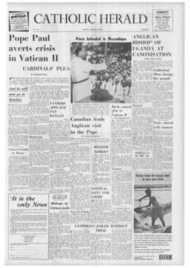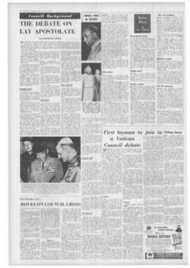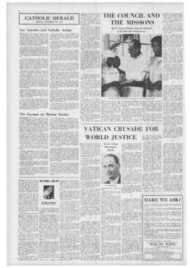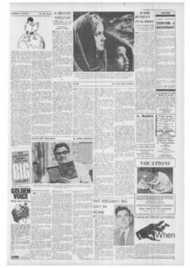Page 7, 16th October 1964
Page 7

Report an error
Noticed an error on this page?If you've noticed an error in this article please click here to report it.
Tags
Share
Related articles
Radio And Tv
Television Am) Radio
Looking And Listening
Radio And Tv
RADIO AND TELEVISION By JAMES GRAHAM
HARRY WORTH, that delightful ditherer of the BBC TV comedy series, is on the toose once more in the seventh edition of his "Here's Harry" adventures. The first programme, from which this picture was taken, was on Tuesday.
Dear Mr. Postmaster-General:
1'1 ANY congratulations on your new appointment. No doubt you're pretty pleased with the election results and the return of your party. Although I'm sorry if you expected something a bit grander than the Post Office when the Prime Minister handed otit the portfolios.
But don't despair. It isn't all postage stamps an postal orders. You may be surprised to learn that your new department is also responsible for the chief medium of popular information and cornmuni cation—the telly.
As you arc new to the job—we shall not miss your predecessor. I can tell you-1 thought you might like a brief run-down on your new communications empire and on the room you have got for the exercise of power.
The telly, Mr. PostmasterGeneral. is divided into two parts, BBC and ITV.
The BBC, you'll find, arc a pretty independent lot. They arc not responsible to the House of Commons for their everyday working like most other Government establishments, but only for their general policy which you and your colleagues discuss when their charter comes up for renewal.
As their charter was renewed this year, you will have to wait ten years before you have another crack at them. And worse than that, Mr. Postmaster-General, the BBC may even snap their fingers at you if they don't like you.
You will remember that at the time of Suez they even sent the Prime Minister of the day. Sir Anthony Eden, packing when he "suggested" a line of broadcasting policy to the BBC's DirectorGeneral.
If they did that to a Prime
Minister, they may not take too much notice of you.
But all is not lost. Your predecessor may have had his limitations exposed in that dreadful Television Act earlier this year, but he has bequeathed you a real trump card.
He has refused to give the BBC any money for their new channel.
You could, if you felt inclined, hamstring the BBC for ever by making them come begging every year for a grant from the Exchequer to cover their deficits. That way they will have a Sword of Damocles hanging over their heads every time they get into your black books.
But if you are more concerned with higher television standards than in the exercise of your own authority, Mr. Postmaster-General. then I am sure you will do one of these things. Either you will raise the licence fee—without taking too big a cut for the GPO general funds, and despite the howls of protests from us viewers, Or you will guarantee an unconditional payment to the BBC for the whole period of their charter. Don't tie it too firmly to the lucrative advertising tax from ITV. That may be a milch cow at the moment. But you may find in about three years' time that you have to drop it for political reasons.
The best thing you could do for the BBC is to leave them free from committees and interference, and insist that they live up to their own high standards.
The BBC told the Pilkington Committee that television was one of the main factors influencing values and moral standards in our society, and that their "comprehensive" service was an effort to discharge the obligations that this Make them live up to that.
No, Mr. Postmaster-General, if you really want to hear your whip sizzle, you had better crack it at ITV. They are a much more nervous lot, and they arc really rather frightened of you.
They want you to give them a second commercial channel in 1968. And they want you to lift the tax levied in the last Television Act.
Under it a slice was taken out of their revenue rather than their profits.
This was silly. It encouraged them to spend less money on programmes and experimentation, and to invest in things like bowling alleys which are not subject to the tax.
The important thing ITV can give to the nation is a balanced. comprehensive and genuine alternative television service to that of the BBC.
But ITV is a Commercial undertaking. Profitability is a ,fine qua 11011 of its existence, as it is with any business enterprise. You must devise a tax which will prevent excessive fortunes being made out of a public concession and, more important, will encourage the cornmercial companies to invest in good television programmes.
One of the , reasons why your predecessor was such a failure was that while he succeeded in taxing the tele-tycoons, he didn't do anything effective about television standards. In fact, his Bill succeeded in creating more inhibitions than incentives.
The best thing you could do, Mr. Postmaster-General, is to put the emphasis of your powerful department on standards rather than taxes, incentives rather than censors.
Only television producers, of course. can produce good television programmes. But the incentive and driving force for those programmes has to come from the top. From you, Mr. Postmaster-General.
Wishing you well,
Sincerely, JAMES GRAHAM.
blog comments powered by Disqus











